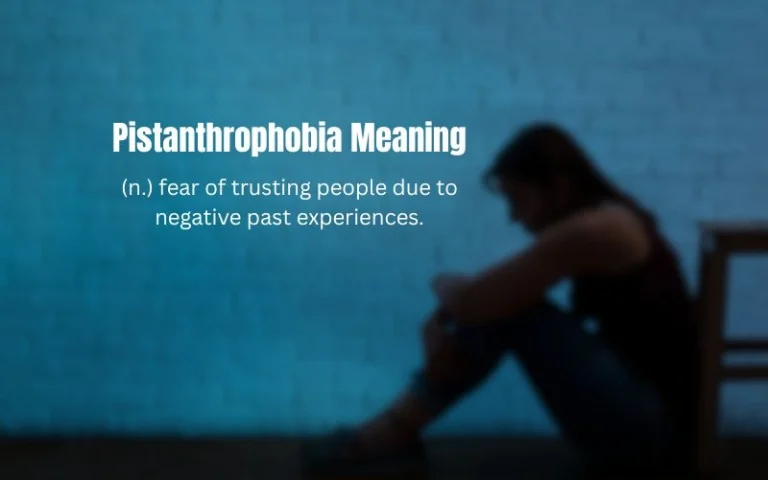Last Updated: October 11, 2025
Direct Answer: Pistanthrophobia meaning refers to an intense, irrational fear of trusting other people or believing in their words and intentions, even when they’ve given you no reason to doubt them.
Disclaimer: This article is for informational purposes only and does not constitute medical or psychological advice. If you believe you have pistanthrophobia or any mental health condition, please consult with a qualified mental health professional.
Quick Reference Table
| Aspect | Details |
|---|---|
| Term Origin | Greek: “pistis” (faith/belief) + “anthropos” (human) + “phobos” (fear) |
| Medical Classification | Specific phobia (anxiety disorder) |
| Severity Level | Ranges from mild to severe |
| Age of Onset | Can develop at any age, often in adolescence or adulthood |
| Gender Prevalence | Affects all genders equally |
| Treatability | Yes, highly responsive to therapy |
What Is Pistanthrophobia Meaning?
When we talk about pistanthrophobia meaning, we’re discussing one of the most emotionally exhausting psychological conditions someone can experience. Imagine being trapped in a world where every smile feels like a potential threat, where kind words seem suspicious, and where human connection itself becomes terrifying. That’s what living with pistanthrophobia feels like for those who experience it.
The meaning of pistanthrophobia breaks down into three parts. “Pistis” comes from Greek and means faith or belief. “Anthropos” means human or person. And “phobos” means fear. So quite literally, pistanthrophobia meaning is the fear of having faith in other people.
But here’s the thing—it’s not just casual distrust. This isn’t someone being naturally cautious or having healthy skepticism. Pistanthrophobia meaning encompasses an overwhelming, compulsive fear that reaches anxiety disorder levels. People with this condition often find themselves unable to form meaningful relationships, maintain friendships, or even function in basic social and professional settings.
Understanding the Real Impact
What Does Pistanthrophobia Person Experience?
A pistanthrophobia person doesn’t wake up one morning and decide that trusting is bad. Instead, their brain has learned—through experience or conditioning—that believing in others leads to pain. For a pistanthrophobia person, trust feels like vulnerability, and vulnerability feels like setting yourself up for betrayal.
What characterizes a pistanthrophobia person is the constant internal battle. They might desperately want close relationships, but their fear creates an impenetrable wall. A pistanthrophobia person often second-guesses intentions, replays conversations obsessively, and interprets neutral comments as hostile.
What Is a Pistanthrophobia Person Called?
If someone asks, “What is a pistanthrophobia person called?” the answer is: someone experiencing pistanthrophobia or a person with trust anxiety disorder. While there’s no special nickname, these individuals are sometimes referred to as having “trust issues” in casual conversation, though that term significantly undersells the severity of what a pistanthrophobia person called by this condition actually experiences.
Pistanthrophobia Meaning in Different Languages
Pistanthrophobia Meaning in English
In English, pistanthrophobia meaning in English is straightforward: the pathological fear of trusting or believing in others. Pistanthrophobia meaning in English emphasizes the psychological component—that this isn’t rational distrust but an anxiety disorder.
Pistanthrophobia Meaning in Hindi
The pistanthrophobia meaning in Hindi translates roughly to “दूसरों पर विश्वास करने का डर” (dusron par vishwas karne ka dar), literally meaning the fear of having faith in others. Pistanthrophobia meaning Hindi recognizes this as a modern psychological condition that transcends language and culture.
Pistanthrophobia Meaning in Telugu
Pistanthrophobia meaning in Telugu would be “ఇతరులపై నమ్మకం కలిగించే భయం” (itharulapai nammakam kalighinche bhayam). Similarly, pistanthrophobia in Telugu describes this fear of trusting others in the Telugu-speaking community.
Pistanthrophobia Meaning in Tamil
The pistanthrophobia meaning in Tamil translates to “மற்றவர்களை நம்புவதற்கான பயம்” (maRRavargaLai nambuvatharkkana payam). Pistanthrophobia in Tamil acknowledges this psychological challenge across Tamil-speaking populations.
Common Symptoms of Pistanthrophobia
Physical Manifestations
When a pistanthrophobia person faces a situation requiring trust, their body might react dramatically. Pistanthrophobia symptoms include:
- Rapid heartbeat and chest tightness when someone offers help or asks for vulnerability
- Sweating and trembling during intimate conversations
- Nausea when considering sharing personal information
- Sleep disturbances from anxious thoughts about others’ intentions
- Tension headaches from constant mental hypervigilance
Emotional and Behavioral Signs
Pistanthrophobia symptoms extend beyond the physical realm. What is pistanthrophobia becomes evident in behavior patterns like:
- Constant need to verify information and check facts independently
- Difficulty making decisions that require relying on others
- Avoiding situations where they must depend on someone
- Sabotaging relationships before they become too close
- Excessive questioning and accusatory behavior toward loved ones
- Perfectionism and extreme self-reliance
Root Causes and Why Pistanthrophobia Develops
Understanding pistanthrophobia meaning requires understanding what causes it. Several factors contribute to pistanthrophobia meaning developing in someone’s psychology:
Childhood Betrayal or Abandonment — When a child experiences significant betrayal, broken promises, or abandonment from a caregiver, their developing brain learns that trust is dangerous. This becomes embedded in their nervous system.
Repeated Relationship Trauma — Adults who’ve experienced multiple betrayals—infidelity, financial fraud, emotional abuse—can develop pistanthrophobia as a protective mechanism.
Parental Modeling — Growing up with parents who demonstrated extreme mistrust or paranoia can normalize this worldview for children.
Social Anxiety and Perfectionism — People with high anxiety levels sometimes develop pistanthrophobia meaning as their anxiety attaches itself to social trust.
Narcissistic or Toxic Relationships — Extended exposure to manipulative people can condition someone to view all trust as foolish.
Pistanthrophobia Treatment Options
The good news? Pistanthrophobia treatment is highly effective. People don’t have to live trapped in this fear forever.
Therapeutic Approaches
Cognitive Behavioral Therapy (CBT) remains the gold standard for pistanthrophobia treatment. This approach helps individuals identify the thought patterns fueling their fear and gradually rewire their brain’s response to trust scenarios.
Exposure Therapy forms another pillar of pistanthrophobia treatment, where individuals slowly and safely increase their exposure to trusting situations while learning they can handle the discomfort.
Psychodynamic Therapy digs deeper into pistanthrophobia treatment, exploring the root causes and early experiences that shaped this fear response.
Lifestyle and Self-Help Strategies
While professional help is ideal, certain strategies support pistanthrophobia treatment:
- Journaling to identify specific trust triggers
- Practicing vulnerability with safe, trustworthy people first
- Meditation and grounding techniques to calm the nervous system
- Building self-compassion for past hurts
- Gradually testing trust in low-stakes situations
Comparison: Pistanthrophobia vs. Other Trust-Related Conditions
| Condition | Pistanthrophobia Meaning | Key Difference |
|---|---|---|
| General Anxiety Disorder | Widespread worry about many things | Specific to trusting others |
| Social Anxiety Disorder | Fear of judgment or embarrassment | Centered on betrayal and deception |
| Paranoid Personality Disorder | Pervasive distrust with behavioral patterns | Often combined with other traits |
| Attachment Disorders | Difficulty forming secure bonds | Related but distinct condition |
Real-Life Impact: How Pistanthrophobia Meaning Affects Daily Life
Work and Professional Relationships
A person struggling with pistanthrophobia often struggles in team environments. They might:
- Struggle to delegate tasks because they don’t believe others will complete them properly
- Create conflict by questioning colleagues’ motives
- Miss out on promotions requiring leadership and trust
- Experience burnout from trying to control everything themselves
Romantic Relationships
This is where pistanthrophobia meaning becomes truly heartbreaking. Partners describe relationships with a pistanthrophobia person as emotionally draining. Pistanthrophobia person may:
- Accuse partners of cheating without evidence
- Monitor communications obsessively
- Sabotage the relationship preemptively
- Prevent emotional intimacy despite desiring it
Friendships and Social Life
A pistanthrophobia person called by this condition often finds friendships superficial. They may avoid opening up, decline invitations, or create drama that pushes friends away.
The Difference: Healthy Caution vs. Pistanthrophobia
Not all trust hesitation is pistanthrophobia. There’s a significant difference between what is pistanthrophobia and normal wariness.
Healthy caution means:
- Taking time to know someone before opening up
- Reading red flags appropriately
- Being selective about vulnerability
- Maintaining independence and boundaries
Pistanthrophobia meaning shows up as:
- Fear response even with repeatedly trustworthy people
- Inability to form ANY close bonds
- Anxiety spirals about others’ intentions
- Physical panic symptoms triggered by trust scenarios
Prevention and Building Trust Capacity
While you can’t prevent pistanthrophobia entirely if you’re predisposed, certain practices help:
Secure Attachment in Childhood — When children experience consistent, responsive caregiving, they develop secure attachment that protects against developing pistanthrophobia meaning.
Processing Past Trauma — Working through betrayals and hurts with a therapist prevents them from hardening into pistanthrophobia.
Gradual Trust Building — Intentionally extending small amounts of trust in safe relationships builds your trust capacity over time.
Community and Connection — Staying socially engaged, even in small ways, prevents isolation that worsens pistanthrophobia.
When to Seek Help for Pistanthrophobia
You should consider professional support for pistanthrophobia treatment if:
- Your fear of trusting others interferes with work or school
- You’ve sabotaged multiple relationships because of trust fears
- You experience anxiety symptoms when considering vulnerability
- You feel lonely but can’t bring yourself to connect
- People describe you as impossible to trust with your vulnerability
- You recognize the pattern but feel powerless to change it
FAQs About Pistanthrophobia Meaning
Q: Is pistanthrophobia meaning the same as trust issues?
No. Pistanthrophobia meaning indicates a clinical phobia and anxiety disorder, whereas “trust issues” is casual language. Pistanthrophobia is significantly more severe and requires professional treatment.
Q: Can someone with pistanthrophobia meaning ever have healthy relationships?
Absolutely. With appropriate pistanthrophobia treatment, many people develop secure relationships. Recovery is genuinely possible with commitment and professional support.
Q: Is pistanthrophobia meaning inherited?
There’s no direct genetic link to pistanthrophobia. However, if parents model extreme distrust, children might learn these patterns. The condition develops primarily through experience and conditioning.
Thank you for reading! For more insights on unique names, check out our previous blog:
- Divisha Name Meaning in Hindi
- Vamika Name Meaning in Hindi
- Sanvi Name Meaning
- Zaviyar Name Meaning in Urdu
- Irha Name Meaning in Urdu
- Shreesha Name Meaning in Marathi
- Ayansh Name Meaning in Hindi
- Shibra Name Meaning in Urdu
- Advik Name Meaning
- Prisha Name Meaning
- Lord Shiva Names
✨ Curious about what your name reveals about your destiny? Try our free Name Numerology Calculator today.

